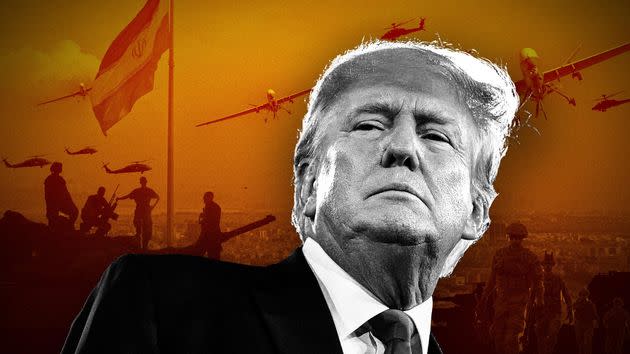Donald Trump Is Promising Peace In A Second Term. War With Iran Seems More Likely.

Views (73)

Trump is so focused on the Islamic Republic that he reportedly kept a document about it that he knew was classified after he left office. With global concern mounting over Iran's nuclear program, his volatility poses serious risk.
To hear Donald Trump tell it, a vote for him in 2024 is a vote for world peace.
The narrative serves Trump’s goal of seeming like an outsider fighting a flawed establishment and suits his strategy of seeking votes by appealing to Americans’ fears. But it ignores the issue that would likely pose the biggest foreign policy challenge of a second Trump presidency and one Trump has shown little capacity to handle peacefully: Iran.
“If he returns to power… I think the odds of him being able to deal with Iran are not promising at all,” said Ali Vaez, the director of the Iran project at the International Crisis Group think tank.
The Islamic Republic looms large for the former president.
And as president, Trump vetoed a bipartisan attempt to make it harder for him to order military action against Iran and reveled in torpedoing President Barack Obama’s landmark 2015 deal to limit Iranian nuclear development.
“Iran’s nuclear program is more advanced now than it has ever been,” one Western official said, describing his government as “extremely concerned.”
In 2018, then-President Donald Trump unilaterally withdrew the U.S. from the international agreement to limit Iran's nuclear program.
“Because of what he did by taking Iran’s nuclear program out of a box and putting it in a microwave, Iran actually has way more leverage than was the case when Trump walked into the Oval Office in 2017,” Vaez said. “If you look at Trump’s career, Iran’s nuclear program is the only thing that he failed to bankrupt.”
The upshot: Trump would face an unprecedented challenge ― with a proven record of seeing violence as the best response.
The Trump campaign did not respond to a request for comment.
Biden’s chance to address the nuclear issue has almost certainly slipped away.
After Trump withdrew the U.S. from the 2015 deal, the five other parties to the agreement ― France, Britain, China, Russia and Germany ― tried to sustain the accord. They pushed for Iran to comply with limits and monitoring requirements and tried to deliver some of the economic benefits for Iranians the deal was meant to provide.
The move frustrated world powers. “The Iranians chose not to take the deal,” argued the Western official, who was not authorized to comment on the record.
Iran knows “that if they go too far it would trigger a major crisis in the region,” the second Western official argued.
Its program is “obviously at a very advanced stage, but we shouldn’t necessarily assume that means they are on a path to a weapon,” the first Western official said. “If they want to come to the table and act in good faith, then we’re open to talking.”
Vaez, the analyst, believes both Tehran and Washington “would like to put a lid on the situation until there is less uncertainty about the political trajectory of the United States.”
Such a compromise could “create time and space for both sides until they know who the next U.S. president would be,” Vaez said. “I don’t expect a deal that would resolve the nuclear crisis in a sustainable fashion.”
The combination of an urgent nuclear question and a reelected Trump is almost certainly explosive.
An essential factor in any renewed agreement would be shifting Iran’s calculus: convincing Tehran it is worthwhile to change its current course and address international concerns about weapon development.
It’s hard to see how Trump would inspire goodwill in the regime.
His unilateral withdrawal from the 2015 deal ― despite Iran’s general compliance ― began the current crisis. And his killing of Iranian leader Qassem Soleimani is considered an Iranian national tragedy.
“There’s just so much bad blood there between the Iranian leadership and him as a result of that single act,” Vaez said. “What the Iranians want to do to him is not to shake his hand but to put a dagger in his back.”
Trump's killing of Iranian general Qassem Soleimani in 2020 sparked fears of U.S.-Iran war and ignited protests worldwide, such as this one in Seoul, South Korea.
Meanwhile, Trump’s talk of “peace through strength” suggests he would be loath to suggest the kind of U.S. steps that could inspire serious talks by, for instance, easing up on his historic “maximum pressure” approach to the Islamic Republic.
Iran could, in fact, interpret Trump’s return as an impetus to become more assertive and speed closer to possessing weapon-grade material, observers worry. Though Tehran’s dialogue with its regional rivals ― notably Saudi Arabia ― has inspired some calm in the Middle East, it also makes it easier to envision an Iran-U.S. conflict in which the Saudis and other U.S. partners dodge fire as Washington and Tehran focus on each other.
Trump’s demonstrated instincts and stated second-term goals pose further hurdles to diplomacy.
One of the Western officials said his government believes Beijing could be a moderating influence in any eventual settlement on the nuclear issue.
“China does not want a crisis in the region that would impact heavily its supply of oil and energy, and they don’t want to have a new member of the nuclear club,” the official said.
China’s heft has grown because sanctions have made Iran extremely dependent on earning money by selling oil to Beijing, noted the other Western official, calling that sway “a significant lever.”
Still, “it remains to be seen to what extent the Chinese are willing to use that lever,” the official continued.
To Vaez, another Trump term in the White House means an Iran policy of perpetual danger.
“It’s a formula for another four years of confrontation between Iran and the U.S. without any possible offramps,” he said.
0 Likes
